 Petzlover
Petzlover Both Bengal and Serengeti are originated from United States. Both Bengal and Serengeti are of same weight. Both Bengal and Serengeti has almost same life span. Both Bengal and Serengeti has same litter size. Bengal requires Moderate Maintenance. But Serengeti requires Low Maintenance
Both Bengal and Serengeti are originated from United States. Both Bengal and Serengeti are of same weight. Both Bengal and Serengeti has almost same life span. Both Bengal and Serengeti has same litter size. Bengal requires Moderate Maintenance. But Serengeti requires Low Maintenance
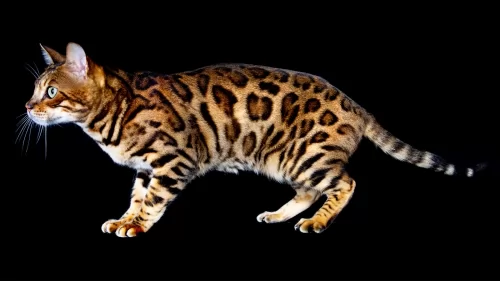 What an exquisite coat the Bengal cat has. It looks like the coat of a wild cat and can have spots, marbling, and rosettes, but it is domesticated, developed from hybrids – the spotted Egyptian Mau and the Asian Leopard cat.
What an exquisite coat the Bengal cat has. It looks like the coat of a wild cat and can have spots, marbling, and rosettes, but it is domesticated, developed from hybrids – the spotted Egyptian Mau and the Asian Leopard cat.
It is the only domestic breed of cat that has rosette markings. It is Jean Mill of California that you associate the Bengal cat with, and she conducted a number of graduate classes in genetics.
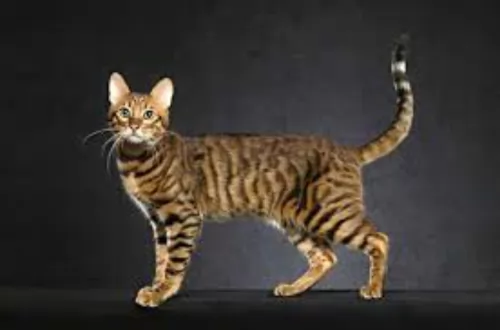 This is a cat breed that was deliberately bred to resemble the Serval cat. It was developed by crossing a Bengal cat and an Oriental Shorthair.
This is a cat breed that was deliberately bred to resemble the Serval cat. It was developed by crossing a Bengal cat and an Oriental Shorthair.
The cat was developed by biologist Karen Sausman in California in 1994. The breed is still under development.
The idea with this hybrid cat was to produce new domestic cat breed that would look like a wild cat but not have the wild characteristics.
The cat is recognized by TICA – The International Cat Association.
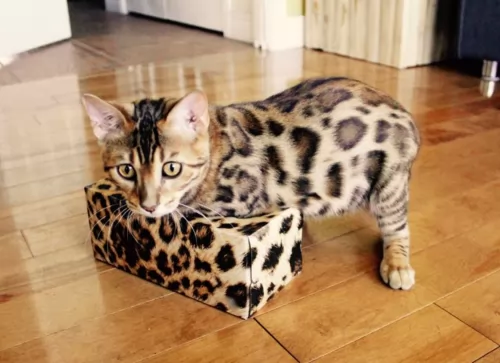 The Bengal looks like a wild cat and it can weigh up to 7kg. It can reach a height of 70cm with long, muscular legs and almond-shaped eyes which are green or blue.
The Bengal looks like a wild cat and it can weigh up to 7kg. It can reach a height of 70cm with long, muscular legs and almond-shaped eyes which are green or blue.
When it comes to the coat of the Bengal cat, it has a wide variety of colors and patterns. The cat can be brown, black, red, grey, spotted, clouded, ticked or rosette.
There are Bengal breeders that claim that their Bengals are hypoallergenic so that they won’t cause an allergic reaction with their owers. This is something that hasn’t been scientifically proved and in fact many will say that there isn’t such as thing as a hypoallergenic cat.
The Bengal is a medium to large-sized cat, being long and lean and muscular. As a low shedder, it is believed the Bengal is a hypoallergenic cat breed – a cat less likely to cause an allergy with its human owners.
When you bring a Bengal cat into your home, you’ll find they are energetic, smart, and playful and they love cavorting around in water.
People who have owned a Bengal say that the cat is friendly and that it enjoys interacting with humans. They’re cats capable of forming strong bonds with their human family, becoming affectionate and loyal. They in turn want to receive lots of loving attention.
They’re intelligent too and are quick to learn. You have to remember that these are part wild cat and that they are only classed as tame from the 4th generation (T4).
The cat has wild traits so it is only natural that it likes to hunt so don’t be alarmed when your Bengal presents you with dead mice, moles, and birds.
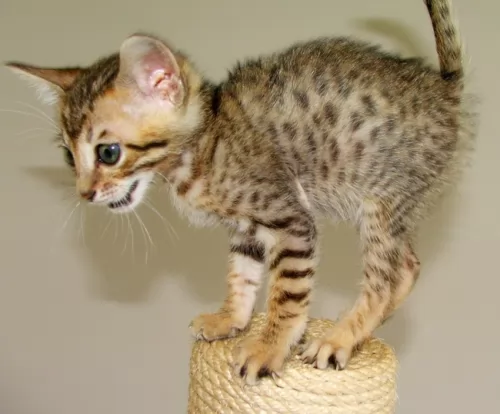 These are spotted cats with long legs and large, round-tipped ears. The neck is long and the body lithe, lean, and muscular.
These are spotted cats with long legs and large, round-tipped ears. The neck is long and the body lithe, lean, and muscular.
They are medium to large in size and can weigh up to 7 or 8kg. The coat is tan and cream with silver or grey coloring as well as black spots and stripes. Some Serengetis appear to be black but on closer look, you see that they have what is known as ‘ghost spotting’ – a black-spotted pattern that can scarcely be seen.
You may even think you are looking at a black panther. The coat is short, silky, smooth, and sleek. The eyes of the cat are round and are usually amber or gold.
The Serengeti is a friendly, social, and confident cat that is quite capable of forming a strong attachment to its human family. It is a loving, loyal cat. The cat can become bored and will need plenty of puzzle toys to keep his mind and body physically active.
You will need to provide him with a scratching post too as he is a lively, energetic cat. This isn’t only an indoor cat. Cats like the Serengeti will need an outdoor enclosure and the Serengeti cat will need branches and perches to leap up onto.
He is an active cat and can become bored if left indoors. They are capable of making a good family pet and are vocal too – telling you all sorts of things.
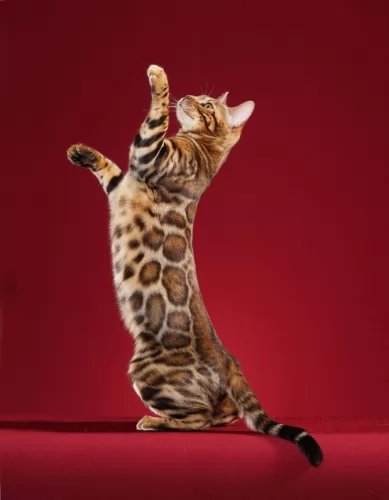 Bengal cats are intelligent and just like a dog he is clever at learning tricks and can even be taught things such as ‘sit’, ‘fetch’ or ‘lie down’. They actually make great companions as they are sensitive to their owner's moods and can even recognize human gestures and adapt their behavior to their owner's mood.
Bengal cats are intelligent and just like a dog he is clever at learning tricks and can even be taught things such as ‘sit’, ‘fetch’ or ‘lie down’. They actually make great companions as they are sensitive to their owner's moods and can even recognize human gestures and adapt their behavior to their owner's mood.
They’re vocal cats too and they like to communicate about their needs, being able to meow in different tones. They’re active cats and they want active owners – those who can spend time with them playing and even going on walks and hikes.
The Bengal certainly is a wonderfully companionable cat.
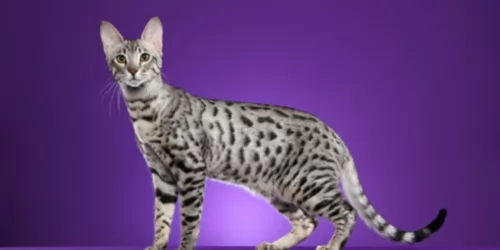 The Serengeti is both a friendly and affectionate cat even though he is a bit shy and overwhelmed in new surroundings.
The Serengeti is both a friendly and affectionate cat even though he is a bit shy and overwhelmed in new surroundings.
He is a cat that talks quite a bit and if he is happy and content he enjoys 'chatting' to you about his day.
He is able to get on well with children in the home as well as with other pets. He is an athletic cat and just loves to climb, and this is why he will certainly need an outdoor enclosure as he loves to dart around madly from time to time, and doing that in your home could be quite dangerous.
He is capable of being a loving cat breed and can form a strong bond with his human family.
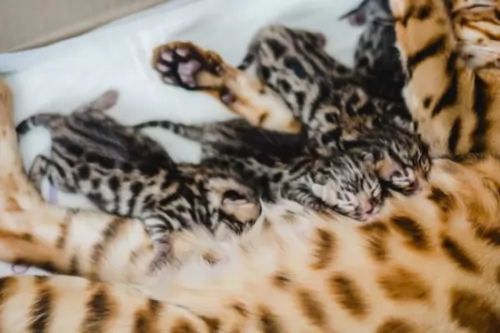 Hypertrophic cardiomyopathy (HCM) is a concern with the Bengal cat breed and this is a disease where the heart muscle becomes thick and unable to pump blood properly.
Hypertrophic cardiomyopathy (HCM) is a concern with the Bengal cat breed and this is a disease where the heart muscle becomes thick and unable to pump blood properly.
It’s a common genetic disease in Bengal cats. Cats used for breeding need to be screened each year to ensure no hypertrophic cardiomyopathy is present.
Another problem with the Bengal cat is Progressive retinal atrophy or PRA. Anyone wanting to breed Bengals should have their cat tested for this eye disease as the disease can lead to blindness.
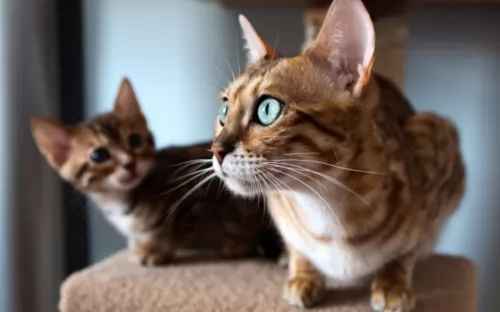 Hybrid Cats such as the Serengeti are a combination of a wild breed and a domestic breed. With good care he can live to be up to 15 years of age and possibly longer.
Hybrid Cats such as the Serengeti are a combination of a wild breed and a domestic breed. With good care he can live to be up to 15 years of age and possibly longer.
Hybrid cats are always controversial because people who have owned them have got both good and bad to say about them. They have some behavioral issues and many of them have an aggressive side, they’re aloof and they refuse to use a litter box. The cat can’t be blamed though because they have that wild side.
They also come with some health issues such as premature birth, miscarriage, diarrhea, and irritable bowel disease. You may just find yourself more often at the vet than you’d like.
You will need to ensure that your Serengeti gets all his vaccines and de-worming treatments.
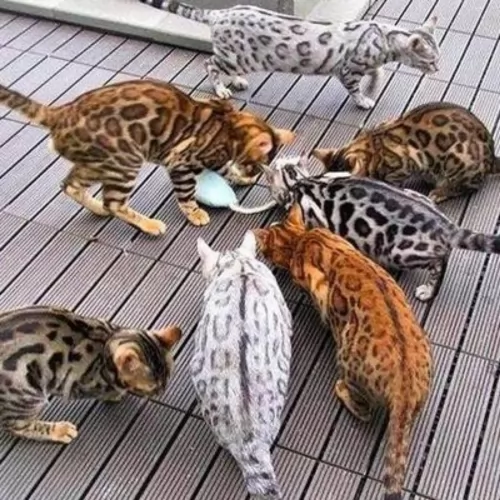 You will need a secured outdoor area for your Bengal cat where he can play and climb. He will need these for his activity levels as well as stimulating toys.
You will need a secured outdoor area for your Bengal cat where he can play and climb. He will need these for his activity levels as well as stimulating toys.
Provide feeding and water bowls and also make sure that you provide your Bengal with a shallow swimming pool as this cat loves water.
The Bengal is a healthy cat breed so it is important to provide your pet cat with the best food there is and to ensure he gets checked out at the vet every year.
Most hybrid breed owners provide raw food as these cats are often sensitive to commercially manufactured food. Having said that, there are high-quality prepared cat foods that will provide your Bengal with everything needed for a healthy life.
Look at providing your pet with a good supplement to ensure your furry friend has every chance to be healthy and happy.
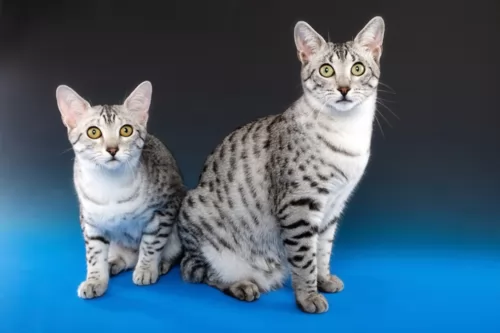 Grooming is easy for the Serengeti as it is a short-haired cat and will require a brush just once a week. Trimming the claws will also be necessary.
Grooming is easy for the Serengeti as it is a short-haired cat and will require a brush just once a week. Trimming the claws will also be necessary.
A cat such as the Serengeti has been developed by crossing the domestic cat with a wild breed. This means that there will be concerns with the temperament and behavior of these cats in a home setting. Apart from being allowed indoors, they will need an outside enclosure.
Having a wild side, while every cat is a carnivore, these cats are even more so. Their diet has to be strictly protein – meat. Wild cats would have a diet made up of birds and lizards. You want to avoid commercial cat foods that are of lower quality and have less meat in and more carbohydrates. This just spells ill health for your cat. Cats also need some fresh raw meat in their diets.
It is important to keep up your Serengeti's veterinary checkups to make sure there aren’t any health concerns.